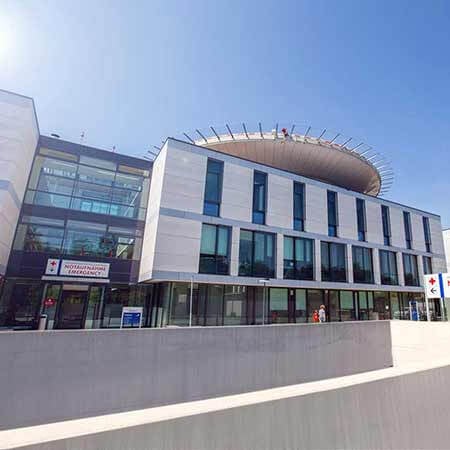Thalassemia is the most common hereditary anemia which develops due to impaired hemoglobin structure. According to the WHO, about 1,5% of the population are carriers of this disease. Hemoglobin defects lead to ineffective erythropoiesis (the maturation of red blood cells) and hemolysis (destruction of red blood cells). With a long course of the disease, an increase in the erythrocyte blood germ occurs, and extramedullary (outside the bone marrow) foci of hematopoiesis may appear.
Content
- Standard treatment
- Gene therapy
- Stem cell transplantation
Standard treatment involves regular blood transfusions. To completely cure the disease, donor stem cell transplantation is performed. Gene therapy can be performed as part of a clinical trial.
You can undergo treatment at the University Hospital Mannheim, the University Hospital Ulm, and the University Hospital Freiburg.
Please leave your request on the Booking Health website, and we will select the most suitable clinic and doctor for you, make an appointment, help prepare the necessary documents, and arrange flights and accommodation. During the treatment in Germany, you will be accompanied by a medical interpreter, and a personal coordinator will be constantly in touch with you.
Standard treatment
The standard treatment for thalassemia involves conservative therapy:
- blood transfusions that are carried out regularly;
- chelation therapy, which is the introduction of chelating agents to remove heavy metals (eliminates iron overload).
These treatment methods do not cure the disease but increase the life expectancy of patients. People with beta-thalassemia major can live up to 40 years. The same life expectancy is observed in the intermediate form of the disease.
However, maintenance therapy does not improve quality of life and does not cure the disease. It only helps doctors save lives and protect the patient from complications.
Splenectomy is another method of supportive treatment, but the attitude of doctors towards it is ambiguous since it is not always possible to get good results. Research data on the effectiveness of this operation are contradictory. Spleen removal is performed to reduce the need for blood transfusions and reduce iron overload, which can damage the liver, kidneys, heart, and endocrine organs. Surgeons in Germany use the laparoscopic technique for spleen removal. This operation is less traumatic as compared to conventional open surgery.
Gene therapy
The essence of the method is gene replacement in autologous (the patient's own) hematopoietic stem cells using viral vectors. Doctors change abnormal genes to normal ones.
Gene therapy is not yet part of standard treatment, but this innovative approach is already being used in some clinics as part of clinical trials and shows good results.
Application on small groups of patients shows that it is quite possible to achieve the production of normal hemoglobin in the body. After treatment, people no longer needed hemo transfusions (blood transfusions). Studies are currently ongoing, upon the completion of which gene therapy can be introduced into clinical practice.
Stem cell transplantation
So far, stem cell transplantation (bone marrow transplantation) remains the most effective treatment for thalassemia. Allogeneic (donor) transplantation provides complete recovery for the patient. The best patient survival rates are achieved in stem cell transplantation from an HLA-identical sibling (brother or sister).
Nonetheless, only 30% of patients with thalassemia have suitable donors in the family. If the patient does not have a related donor, cells are transplanted from an unrelated donor. He is selected using high-resolution HLA typing. The more matches, the better the results. The main disadvantage of this type of transplantation is the high frequency of acute and chronic graft-versus-host reactions, as well as the risk of graft rejection due to insufficient compatibility.
Modern conditioning regimes used in Germany allow for minimizing risks. The results of allogeneic transplantations are not much inferior to autologous transplantations.
The risk of complications in transplantation from the HLA-identical sibling:
- graft rejection – 6,9%;
- graft-versus-host reaction – 3,6%.
The risk of complications in transplantation from an unrelated donor:
- graft rejection – 1,9%;
- graft-versus-host reaction – 9,6%.
Overall and event-free survival of patients is comparable in these two options for stem cell transplantation.
The sources of stem cells are as follows:
- bone marrow;
- peripheral blood;
- cord blood.
Studies show that the best treatment results can be achieved with the use of bone marrow. The transplantation of cells from peripheral blood is slightly inferior in efficiency. Cord blood is rarely used: studies have shown unacceptably high rates of transplant rejection. Therefore, this biomaterial can be used as stem cells only in cases where it is not possible to use the donor's blood or bone marrow.
If a suitable unrelated donor cannot be found and there is no HLA-identical sibling, haploidentical transplantation can be performed. The donor is only half matched. However, he can be found easily: in 90% of cases, a suitable person will be found among brothers, sisters, parents or second-degree relatives.
The results of such a transplantation are worse than in stem cell transplantation from the HLA-identical sibling or the compatible unrelated donor. After the procedure, acute 1-2 grade graft-versus-host reactions develop in 30% of cases; chronic reactions are common in 16% of cases, and graft rejection occurs in 16% of cases.
In Germany, significant progress has been made in stem cell transplantation from a haploidentical donor. In 2018, an international multicenter study involving 24 children was completed, in which, after haploidentical transplantation, patients were infused with donor genetically modified T lymphocytes – inducible caspase 9. The drug was used to prevent bone marrow rejection, and the risk was almost halved. In addition, no cases of grade 3-4 graft-versus-host disease were reported, and only 13% of patients developed grade 1 reactions. Thus, in terms of efficacy and safety, haploidentical transplantation approaches bone marrow transplantation from compatible unrelated donors or HLA-identical siblings.
To undergo thalassemia diagnostics and thalassemia treatment in Germany, you are welcome to use the services of the Booking Health company. On our website, you can find out the cost of medical services. You can compare how much is the price for treatment in different clinics in Germany to book a medical care program at favorable prices. The specialists of the Booking Health company will help you choose the most suitable clinic and organize your trip.
Authors:
The article was edited by medical experts, board certified doctors Dr. Nadezhda Ivanisova and Dr. Sergey Pashchenko. For the treatment of the conditions referred to in the article, you must consult a doctor; the information in the article is not intended for self-medication!
Sources:
National Center for Biotechnology
NORD - National Organization for Rare Disorders
Healthline










